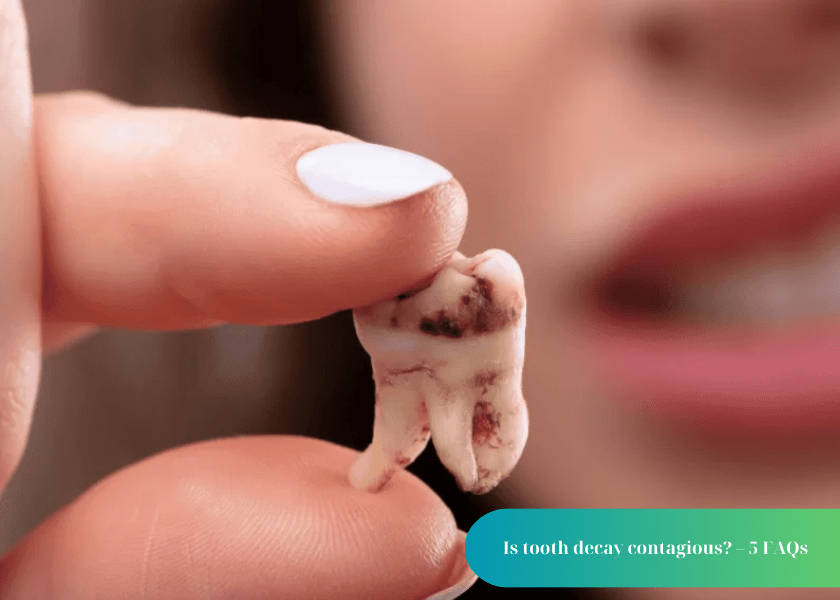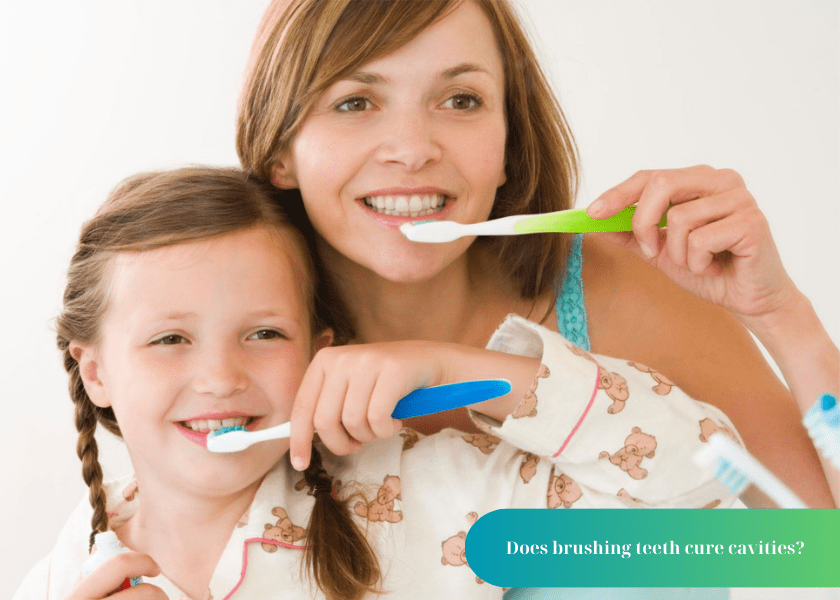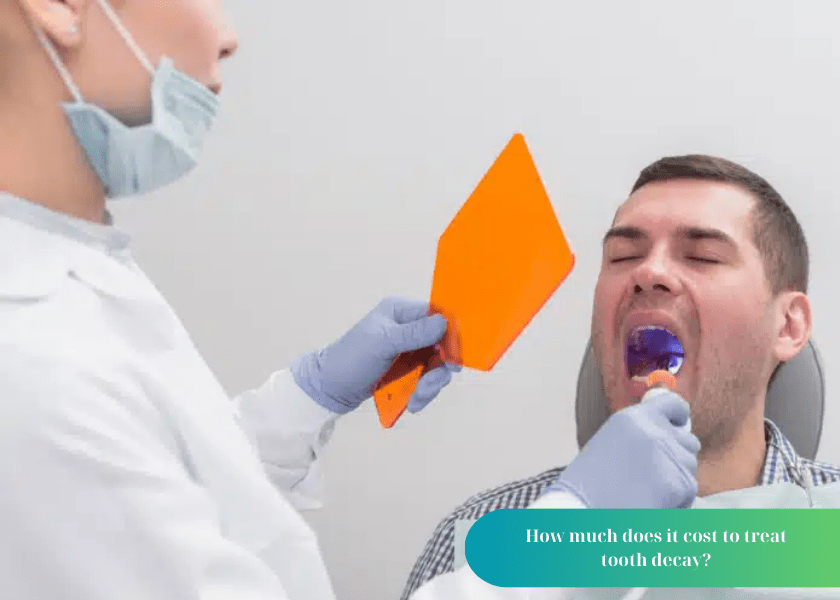Is tooth decay contagious? Tooth decay is a fairly common oral condition today. However, many people take this condition lightly because it does not have a big impact on health. Only when they experience persistent pain or discomfort do people start to seek dental treatment. This shows that tooth decay has become serious because the pain shows that the teeth have been worn quite badly.
Let’s find out with BeamDental: Is tooth decay contagious? Does brushing your teeth cure cavities? How much does it cost to treat tooth decay? , …. through the article below!
Tư vấn chuyên môn bài viết:
BÁC SĨ DƯƠNG THỊ THÙY NGA
Is tooth decay contagious?

Is tooth decay contagious? Tooth decay is a condition in which the tooth structure is eroded due to the destruction of the hard parts of the tooth, creating cracks or many smaller holes in the tooth and black streaks on the destroyed areas. Tooth decay is a common condition worldwide, including in children, teenagers and even the elderly.
Tooth decay is considered a common condition because it is closely related to oral care habits, even in cases where each person has a low calcium content, making the teeth no longer strong, or thin enamel that cannot hold the teeth, causing tooth decay.
According to research, in most cases, tooth decay is caused by food plaque due to eating a lot of sugar and improper oral hygiene. These are considered the main causes of tooth decay.
In addition, tooth decay can also be spread by people around. Tooth decay is considered a contagious disease, especially for children and young children. Similar to any other infectious disease, tooth decay bacteria will spread from person to person in all ways if not strictly prevented.
See more: What should do with tooth decay in 5-year-old children?
Does brushing teeth cure cavities?

In addition to understanding “is tooth decay contagious?”, it’s important to know if brushing your teeth can cure cavities. There are controversial opinions surrounding THIS issue, detecting cavities as early as possible can be treated early will reduce many dangerous risks to the oral health later including tooth damage, causing bad breath, gingivitis and periodontitis, tooth wear, tooth abscess, even permanent tooth loss.
For the health of the body, cavities are also the cause of increased risk of diseases such as diabetes, affecting memory because the tooth root is related to the central nervous system and making pregnant women more likely to have premature birth.
Although toothpastes contain ingredients that whiten teeth and add minerals to make teeth stronger, this does not mean that toothpastes and regular cleaning can eliminate cavities even at the mildest level. Therefore, brushing teeth will not reduce cavities. Brushing your teeth cleanly helps prevent and significantly reduce the risk of tooth decay.
Food debris is always the most dangerous cause of many tooth decay diseases, so brushing your teeth regularly helps remove plaque. Therefore, we are always advised to brush our teeth at least 2 times a day to remove plaque on the teeth, helping to protect and reduce the risk of tooth decay.
See more: Tooth Decay Treatment: 5 Effective Methods and Techniques
Should a tooth be extracted or filled?

In addition to understanding “is tooth decay contagious”, it’s important to consider whether a tooth should be extracted or filled. Dental treatment is recommended to be treated as soon as possible, the treatment process will be quicker, the tooth structure will be more easily preserved and the risk of permanent tooth damage will be reduced.
To be able to detect some oral diseases such as tooth decay early, you need to monitor and visit your dentist regularly, because if the tooth is detected promptly, the dentist will find the most appropriate and effective treatment methods for the tooth. Should a tooth be extracted or filled depending on the condition of your tooth decay:
For mild tooth decay
Filling is considered the most appropriate and effective method because this method fills the holes to prevent the development of tooth decay and restore the patient’s ability to eat and chew.
For this method, the dentist will clean your teeth and remove damaged tooth tissue.
After that, the doctor will use special filling materials such as Composite, which is a cleaning agent commonly used to fill the grooves and holes in some parts of the tooth that have been damaged. Finally, the doctor will use a laser to solidify the mixture on the tooth so that the tooth can be restored to its original shape. Finally, the doctor only needs to clean and polish the tooth to complete the filling for the patient.
For severe tooth decay
A tooth is diagnosed with severe tooth decay when bacteria have penetrated the tooth’s pulp, causing pulp infection and pulpitis, making you feel more uncomfortable and painful, and the patient’s tooth structure has become too dehydrated to recover.
At this time, the doctor will prescribe the removal of the entire tooth to avoid more dangerous complications that may occur later, such as abscesses around the tooth root, pulpitis, etc. After tooth extraction, the patient also needs to undergo alternative treatment for damaged teeth to restore the ability to eat and chew, preventing other teeth from becoming loose and falling out.
See more: What foods should you avoid eating with tooth decay? and 4 things to know
How much does it cost to treat tooth decay?

In addition to understanding “is tooth decay contagious?”, it’s important to consider “how much does it cost to treat tooth decay?”. In reality, the cost of dental treatment also has certain changes because it depends on too many factors:
Degree of tooth decay
As mentioned above, depending on the severity of the tooth decay, the doctor will choose and use the appropriate treatment method. At the same time, tooth decay in different locations will also have different levels of severity, so the cost of treatment in each case will also change more or less.
For mild cases of tooth decay, the doctor will choose to apply treatment by tooth filling to fix it. The above method does not require high costs, the process is simple and can be performed on the same day without causing pain.
But for severe cases of tooth decay such as affecting the bone marrow, then the treatment of tooth decay will require additional root canal treatment and the cost of root canal treatment and root canal cost will have different prices depending on the type of material used in root canal treatment. After surgery, the tooth will also be restored according to the usual method such as making porcelain teeth or worse, the entire tooth can be cut off. Therefore, depending on the requirements and conditions, the cost of treatment will have different increases.
Number of decayed teeth
Usually, the cost of treatment at the dentist will be calculated per tooth, so the cost of treating tooth decay will also correspond to the number of teeth treated. In the case of only 1 or 2 decayed teeth, the cost of treatment will be cheaper than teeth with 3 or more decayed teeth.
Doctor’s skills and dental equipment
A factor that also affects the treatment of tooth decay at each dental clinic is the level of the doctor and the equipment and machinery provided by the dental clinic. For dental clinics that are more confident in their doctors’ skills as well as invest in the most modern and advanced machinery, the cost will always be higher but still ensure aesthetics and create a good experience for customers when using the dental clinic.
Therefore, do not hesitate to choose reputable dental clinics that can treat tooth decay most effectively, ensuring quality and thoroughly treating tooth decay.
Like many other infectious diseases, tooth decay is also quite easily spread through daily activities and sharing personal items. Therefore, each person needs to have preventive measures for themselves and their family members to ensure oral health and limit some of the risks caused by tooth decay.
We have just addressed the common question: Is tooth decay contagious? At BeamDental, we take every measure to ensure that your orthodontic treatment is not only effective but also enhances your facial aesthetics. With our experienced team, modern equipment, and personalized care, you can trust that your braces experience will be smooth and successful. When you choose BeamDental, you’ll leave with a smile that you’re proud to show off, completely satisfied with the quality of service and the results we deliver.
See more: Is it necessary to extract tooth number 6 if it has cavities?
BEAMDENTAL – HỆ THỐNG NHA KHOA TIÊU CHUẨN HÀNG ĐẦU
CHI NHÁNH HÀ NỘI
CS1: 7B Thi Sách, Ngô Thì Nhậm, Hai Bà Trưng, Hà Nội - 0934.61.9090
CS2: 98C Chiến Thắng, Văn Quán, Hà Đông - 0934.61.9090
CHI NHÁNH TP.HỒ CHÍ MINH (HCM)
56 Nguyễn Đình Chiểu, Đa Kao, Quận 1, Tp.Hồ Chí Minh - 0766.00.8080
GIỜ HOẠT ĐỘNG:
09h00 – 21h00. Tất cả các ngày trong tuần
Link web: beamdental.com.vn



